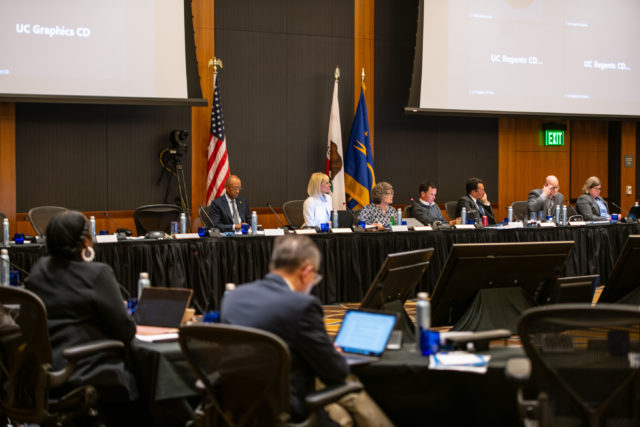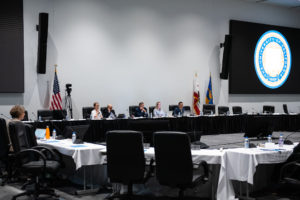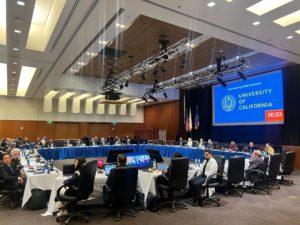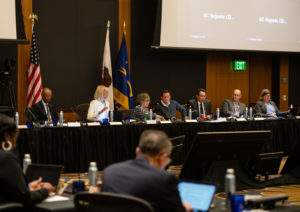SAN FRANCISCO – The UC Board of Regents discussed the UC’s financial future during its Jan. 22 meeting.
The board held its bimonthly meeting Jan. 22 to Jan. 23 at UC San Francisco. During the meeting, the finance and capital strategies committee and academic and student affairs committee reviewed key financial proposals for the University.
The finance and capital strategies committee discussed the UC’s budget for the upcoming fiscal year – which aims to navigate rising costs and potential cuts in state funding – according to the item.
The state proposed a reduction of over $270 million in funding for the UC in the upcoming fiscal year, according to the item.
[Related: UC Board of Regents recommends tuition increase for out-of-state students]
Nathan Brostrom, the executive vice president and chief financial officer of the UC, said due to budget cuts, the UC must take $109.8 million of funding from the Middle Class Scholarship. Brostrom added that the University has heavily relied on expanding the program to help provide debt-free pathways for students.
Regent Josiah Beharry voiced concerns about the impact of cutting the scholarship, which helps many students who qualify for financial aid graduate without debt.
Brostrom said 69% of incoming Californian UC students will graduate debt-free and that 15% of them rely on this scholarship to do so. He added that while the program will still be offered, progress in its expansion will likely continue at a slower pace due to reduced funding.
Miguel Craven, the president of the Associated Students of UC Merced, urged individual campuses to work closely with students to address their needs. He added that although basic needs services were originally meant for emergencies, a growing number of students now rely on them.
[Related: Members of UC community shares concerns about divestment, wages with the board]
The UC Student Association has identified expanding food security programs for undocumented and international students to all undergraduate campuses as one of its key budget priorities for the 2025-2026 fiscal year.
“Use students to go out there and tell these stories and be able to use that as leverage to hopefully receive some more funding later down the line,” Craven said.
Regent Michael Cohen said the budget challenge requires the regents to focus on individual campus budgets more than they traditionally have, adding that he finds the state’s long-term deficit the most concerning.
“Even if we continue to have an uptick in revenues for the short term, that doesn’t signal that we’re out of the woods,” he said.
Following the budget proposal discussion, the academic and student affairs and the finance and capital strategies committees held a joint meeting to review the Multi-Year Compact between California Gov. Gavin Newsom and the UC.
In this agreement, Newsom pledged to give the UC a 5% base budget increase each year from 2023 to 2027, according to the item. In exchange, the UC is set to meet goals in six broad policy categories: access, student success and equity, affordability, collaboration, workforce preparedness and online resources, Brostrom said.
The areas in the Compact include 22 individual goals, Brostrom said. He added that 18 goals were achieved or met, two goals were partially met and two goals were not met during the 2023-2024 fiscal year.
Significant progress was made in providing a debt-free education to UC students, said Caín Díaz, the UC’s associate vice president of budget analysis and planning. Fifty-eight percent of California resident undergraduate students received Path to Debt-Free financial aid packages.
Regent Maria Anguiano said she believes it is important for the regents to stay focused on accomplishing these goals despite financial challenges.
“It represents the promises we’ve made to Californians in terms of having UC being more accessible, more affordable in closing equity gaps,” Anguiano said.
Cohen said he believes these goals align with the regents’ broader objectives for 2050.
“These are our strong commitments that we need to keep momentum moving,” Cohen said.






Comments are closed.